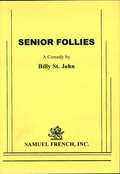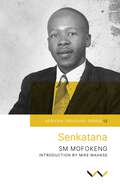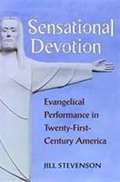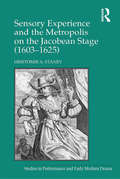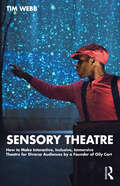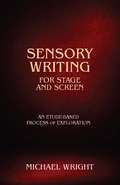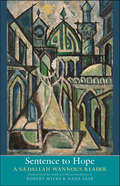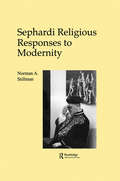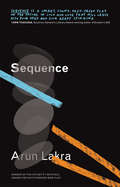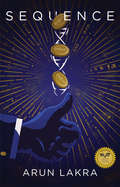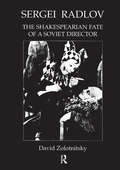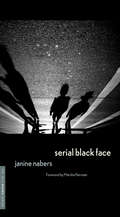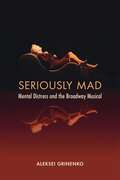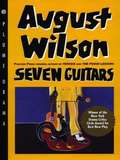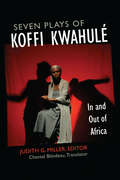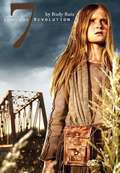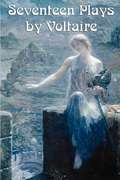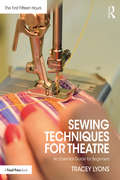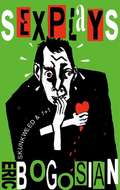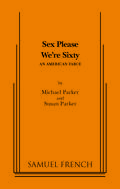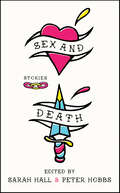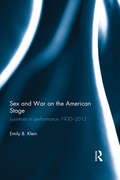- Table View
- List View
Senior Follies
by Billy St. JohnComedy / 4m, 5f / Unit set / The rocking is not done in chairs at the Pleasant Valley Retirement Home, especially since Howard discovered Viagra! The feisty divorcee and lovely widow who are constantly scurring out if his reach and refuse to play strip poker or skinny dip in the hot tub breathe a sigh of relief when a new resident actually seems to enjoy Howard's advances. She turns out to be a con artist intent on fleecing Howard and, with the help of her brother, a shy spinster. Other roles for senior actors include a less than energetic wife and her husband, a gardening fanatic. Don't miss the hilarity in this wonderful comedy for a mature cast by the author of The Abduction, The Reunion and other plays.
Senkatana (African Treasury Series #2)
by Sophonia Machabe MofokengSenkatana is a tragic play adapted from Sotho folk narrative. The play is regarded as a classic of Sesotho literature.Seen as one of the greatest essayists and dramatists writing in Southern Sotho, Senkatana was Mofokeng’s first book, published in 1952 in the African (then Bantu) Treasury Series, an imprint of Witwatersrand University Press.
Sensational Devotion: Evangelical Performance in Twenty-First-Century America
by Jill StevensonIn "Sensational Devotion, " Jill Stevenson examines a range of evangelical performances, including contemporary Passion plays, biblical theme parks, Holy Land re-creations, creationist museums, and megachurches, to understand how they serve their evangelical audiences while shaping larger cultural and national dialogues. Such performative media support specific theologies and core beliefs by creating sensual, live experiences for believers, but the accessible, familiar forms they take and the pop culture motifs they employ also attract nonbelievers willing to try out these genres, even if only for curiosity s sake. This familiarity not only helps these performances achieve their goals, but it also enables them to contribute to public dialogue about the role of religious faith in America. Stevenson shows how these genres are significant and influential cultural products that utilize sophisticated tactics in order to reach large audiences comprised of firm believers, extreme skeptics, and those in between. Using historical research coupled with personal visits to these various venues, the author not only critically examines these spaces and events within their specific religious, cultural, and national contexts, but also places them within a longer devotional tradition in order to suggest how they cultivate religious belief by generating vivid, sensual, affectively oriented, and individualized experiences. "
Sensory Experience and the Metropolis on the Jacobean Stage (Studies In Performance And Early Modern Drama Ser.)
by Hristomir A. StanevAt the turn of the seventeenth century, Hristomir Stanev argues, ideas about the senses became part of a dramatic and literary tradition in England, concerned with the impact of metropolitan culture. Drawing upon an archive of early modern dramatic and prose writings, and on recent interdisciplinary studies of sensory perception, Stanev here investigates representations of the five senses in Jacobean plays in relationship to metropolitan environments. He traces the significance of under-examined concerns about urban life that emerge in micro-histories of performance and engage the (in)voluntary and sometimes pre-rational participation of the five senses. With a dominant focus on sensation, he argues further for drama’s particular place in expanding the field of social perception around otherwise less tractable urban phenomena, such as suburban formation, environmental and noise pollution, epidemic disease, and the impact of built-in city space. The study focuses on ideas about the senses on stage but also, to the extent possible, explores surviving accounts of the sensory nature of playhouses. The chapters progress from the lower order of the senses (taste and smell) to the higher (hearing and vision) before considering the anomalous sense of touch in Platonic terms. The plays considered include five city comedies, a romance, and two historical tragedies; playwrights whose work is covered include Shakespeare, Jonson, Webster, Fletcher, Dekker, and Middleton. Ultimately, Stanev highlights the instrumental role of sensory flux and instability in recognizing the uneasy manner in which the London writers, and perhaps many of their contemporaries, approached the rapidly evolving metropolitan environment during the reign of King James I.
Sensory Theatre: How to Make Interactive, Inclusive, Immersive Theatre for Diverse Audiences by a Founder of Oily Cart
by Tim WebbSensory Theatre: How to Make Interactive, Inclusive, Immersive Theatre for Diverse Audiences by a Founder of Oily Cart is an accessible step-by-step guide to creating theatre for inclusive audiences, such as young people on the autism spectrum or affected by other neuro-divergent conditions and children under two. Conventional theatre relies on seeing and hearing to involve its audience; sensory theatre harnesses the power of five or more senses to address its participants who have different ways of relating to the world around them. This book is an insightful history of Oily Cart and its pioneering development of work for the very young, including Baby Theatre, and for neuro-divergent audiences including those on the autism spectrum. It gives a clear introduction to the fundamental concepts of this theatre, suggests a host of practical techniques drawn from over forty years of experience, and describes some of Oily Cart’s most radical innovations, including theatre on trampolines, in hydrotherapy pools, and with flying audiences in the company of aerial artists. The book also includes copious photos from the Oily Cart’s archives and links to videos examples of the company’s work. Readers will learn how to: Research the intended audience while not being led astray by labels. Create a welcoming, immersive sensory space in classrooms, nurseries, school halls, and playgrounds. Devise sensory stories that can be adapted to suit different audiences. Recruit, audition, cast, and run rehearsals. Ensure that the production is truly sensory and interactive. Written for Theatre for Young Audiences, Drama in Education, and specialized Applied Theatre courses, as well as educators and theatre practitioners interested in creating inclusive, interactive productions, Sensory Theatre offers a goldmine of ideas for making work that connects with audiences who can be the hardest to reach.
Sensory Writing for Stage and Screen: An Etude-Based Process of Exploration
by Michael WrightThrough a series of systematic explorations across a wide range of scenarios, Sensory Writing for Stage and Screen offers script writers exercises for attending to their own sensory experiences as a means to exploring the sensory experiences—and worlds—of the characters they create.
Sentence to Hope: A Sa'dallah Wannous Reader (The Margellos World Republic of Letters)
by Sa'dallah WannousThe first major English‑language collection of plays and essays by Syrian playwright Sa'dallah Wannous Sa'dallah Wannous is acknowledged to be one of the Arab world’s most significant playwrights, writers, and intellectuals of the twentieth century. This is the first major English‑language collection that brings together his most significant plays and essays. Selections include the groundbreaking 1969 play An Evening’s Entertainment for the Fifth of June, a scathing indictment of the duplicity of Arab leaders during the 1967 War, as well as Wannous’s most celebrated play, Rituals of Signs and Transformations, a bold treatment of homosexuality, prostitution, clerical corruption, and the quest for female liberation. In addition to his work as a playwright, Wannous, like Brecht, was an astute theatrical and cultural critic, and his essays, some of which are included here, offer shrewd diagnoses of the ills of Arab society and the essential role of theater in ameliorating them.
Sentimental Opera
by Stefano CastelvecchiSentimental Opera is a study of the relationship between opera and two major phenomena of eighteenth-century European culture - the cult of sensibility and the emergence of bourgeois drama. A thorough examination of social and cultural contexts helps to explain the success of operas such as Paisiello's Nina as well as the extreme emotional reactions of their audiences. Like their counterparts in drama, literature and painting, these works brought to the fore serious contemporary problems including the widespread execution of deserters, the treatment of the insane, and anxieties relative to social and familial roles. They also developed a specifically operatic version of the dominant language of sensibility. This wide-ranging study involves such major cultural figures as Goldoni, Diderot and Mozart, while refining our understanding of the theatrical genre system of their time.
Separate Beds
by Mj CruiseErnie and Twink are in the autumn of their lives. In celebration of their thirtieth wedding anniversary, the couple's children send them on a Caribbean cruise. Free of chores and children, Ernie and Twink are wined, dined, and introduced to exciting people. When they meet the rich, seductive Blake and Beth, who still seem to have a perfect life together after ten years of marriage, Twink becomes infatuated with the glamour of the other couple's lives and seeks to reignite the spark in her own marriage.
Sephardi Religious Responses/M
by StillmanFirst Published in 1995. Routledge is an imprint of Taylor & Francis, an informa company.
Sequence
by Arun LakraTheo has been named Time Magazine's Luckiest Man Alive. For twenty consecutive years he has successfully bet double or nothing on the Super Bowl coin toss. And he's getting ready to risk millions on the twenty-first when he is confronted by Cynthia, a young woman who claims to have figured out his mathematical secret. Stem-cell researcher and professor Dr. Guzman is on the verge of a groundbreaking discovery. She's also learned that one of her students has defied probability to get all 150 multiple-choice questions wrong on his genetics exam, but it's not until he shows up to her office in the middle of the night that she's able to determine if it's simply bad luck. The two narratives intertwine like a fragment of DNA to examine the interplay between logic and metaphysics, science and faith, luck and probability. Belief systems clash, ideas mutate, and order springs from chaos. With razor-sharp wit and playful language, Sequence asks, in our lives, in our universe, and even in our stories, does order matter?
Sequence (Second Edition)
by Arun Lakra“Luck is like irony. Not everybody who thinks they got it, got it.” Theo has been named Time Magazine’s Luckiest Man Alive. For twenty consecutive years he has successfully bet double or nothing on the Super Bowl coin toss. And he’s getting ready to risk millions on the twenty-first when he is confronted by Cynthia, a young woman who claims to have figured out his mathematical secret. Stem-cell researcher and professor Dr. Guzman is on the verge of a groundbreaking discovery. She’s also learned that one of her students has defied probability to get all 150 multiple-choice questions wrong on his genetics exam, but it’s not until he shows up to her office in the middle of the night that she’s able to determine if it’s simply bad luck. The two narratives intertwine like a double helix of DNA to examine the interplay between logic and metaphysics, science and faith, luck and probability. Belief systems clash, ideas mutate, and order springs from chaos. With razor-sharp wit and playful language, Sequence asks, in our lives, in our universe, and even in our stories, does order matter?
Sergei Radlov: The Shakespearian Fate of a Soviet Director
by David ZolotnistkyFirst Published in 1996. Professor Zolotnitsky provides a picture of the life and work of Sergei Radlov - one of the most outstanding interpreters of Shakespeare on the Soviet stage in the 1930s. Sergei Radlov started as one of the left-wing directors among the disciples and companions of Vsevolod Meyerhold in post-revolutionary Russia. He directed Jack London, Ernst Toller, Evgeni Zamyatin and updated Aristophanes. In the latter he did "modern" operas, such as "The Love for Three Oranges" by Sergei Prokofiev and "Der ferne Klang" by Franz Schrecker.
Serial Black Face
by Marsha Norman Janine NabersThe 2014 winner of the Yale Drama Series "The play does not have a tragic ending, though you will be certain that it must. But it is a tragic story. It is the tragedy of lives lived without hope of deliverance. . . . I will leave you to read the play and determine how on earth we get to a satisfying ending to this tragic tale of a woman without a chance. But that ending is the genius of Nabers's work, her faith in the ability of people with no chance, to find one. "-Marsha Norman, from the Foreword The year is 1979 and a serial killer in Atlanta is abducting and murdering young black children. Against a backdrop of fear and uncertainty, playwright Janine Nabers explores the emotional battleground where an African-American single mother wars with her teenage daughter, each coping in her own way with personal tragedy and loss. The volatility of their situation is intensified when a severely damaged and devastatingly handsome stranger becomes an integral part of their lives. "Serial Black Face" is the seventh winner of the DC Horn Foundation/Yale Drama Series Prize, selected by Pulitzer Prize-winning playwright Marsha Norman. At once startling, engrossing, suspenseful, and exhilarating, Nabers's powerful drama employs a real-life nightmare, the Atlanta Child Murders of the late 1970s, to incisively examine human frailty and the prickly complexities of a mother-daughter relationship. A stunning theatrical work, both thoughtful and profoundly moving, "Serial Black Face" is richly deserving of this year's prize. "
Seriously Mad: Mental Distress and the Broadway Musical
by Aleksei GrinenkoTheatermakers in the United States have long been drawn to madness as a source of dramatic spectacle. During the Broadway musical’s golden age in the mid-twentieth century, creative teams used the currently in-vogue psychoanalytic ideas about mental life to construct troubled characters at odds with themselves and their worlds. As the clinical and cultural profile of madness transformed over the twentieth century, musicals continued to delve into the experience of those living with mental pain, trauma, and unhappiness. Seriously Mad offers a dynamic account of stage musicals’ engagement with historically significant theories about mental distress, illness, disability, and human variance in the United States. By exploring who is considered mad and what constitutes madness at different moments in U.S. history, Aleksei Grinenko shows how, in attempts to bring the musicals closer to highbrow sophistication, theater dramatized serious medical conditions and social problems. Among the many Broadway productions discussed are Next to Normal, A Strange Loop, Sweeney Todd, Man of La Mancha, Gypsy, Oklahoma!, and Lady in the Dark.
Seven Guitars
by August WilsonFull Length, Tragic comedy Characters: 4 male, 3 female Exterior Set The sixth in the author's decade by decade exploration of the black experience in America, two of which have won Pulitzer Prizes, Seven Guitars is part bawdy comedy, part dark elegy and part mystery. In the backyard of a Pittsburgh tenement in 1948, friends gather to mourn for a blues guitarist and singer who died just as his career was on the verge of taking off. The action that follows is a flashback to the busy week leading up to Floyd's sudden and unnatural death. "Displays a narrative sweep and almost biblical richness of language and character. . . . Mr. Wilson writes so vividly that the play seems to have the narrative scope and depth of a novel. "-The New York Times. "Impressive . . . with wild, untamed elements of symbolic fantasy, and the language . . . is used with the specific riff like fluency and emotional impact of jazz. "-New York Post. Winner of the N. Y. Drama Critics Award for Best Play.
Seven Plays of Koffi Kwahulé: In and Out of Africa
by Chantal Bilodeau Judith G. MillerThe work of renowned Ivoirian playwright Koffi Kwahulé has been translated into some 15 languages and is performed regularly throughout Europe, Africa, and the Americas. For the first time, Seven Plays of Koffi Kwahulé: In and Out of Africa makes available to an Anglophone audience some of the best and most representative plays by one of Francophone Africa’s most accomplished living playwrights. Kwahulé’s theater delves into both the horror of civil war in Africa and the diasporic experience of peoples of African origin living in Europe and the “New World.” From the split consciousness of the protagonist and rape victim in Jaz to the careless buffoonery of mercenaries in Brewery, Kwahulé’s characters speak in riffs and refrains that resonate with the improvisational pulse of jazz music. He confronts us with a violent world that represents the damage done to Africa and asks us, through exaggeration and surreal touches, to examine the reality of an ever-expanding network of global migrants. His plays speak to the contemporary state of humanity, suffering from exile, poverty, capitalist greed, collusion, and fear of “the other”—however that “other” gets defined. Judith G. Miller’s introductory essay situates Kwahulé among his postcolonial contemporaries. Short introductory essays to each play, accompanied by production photos, contextualize possible approaches to Kwahulé’s often enigmatic work. Anglophone theater scholars and theater professionals eager to engage with contemporary theater beyond their borders, particularly in terms of what so-called minority theater artists from other countries are creating, will welcome this indispensable collection. Students and scholars of African studies and of global French studies will also find this work intriguing and challenging.
Seven for the Revolution
by Rudy RuizA young Latina struggles to communicate with her immigrant grandfather when her mother prohibits her from speaking Spanish. <P><P>A boy grapples with the slippery nature of laws, rules and ambition along the US-Mexico border in his quest for the American Dream. <P><P>An elderly woman's land, life and loyalties are divided by a controversial border fence. <P><P>A South American immigrant encounters racism and love in an LA elevator as turmoil swirls around a radical change in immigration policy. <P><P>In post-apocalyptic New York, a Latina fights to defend the last vestiges of a nation's pride as disgruntled creditors threaten to confiscate the Statue of Liberty.
Seventeen Plays by Voltaire
by VoltaireA collection containing Alzire, Amelia, Brutus, Caliline, Mahomet, Mariamne, Merope, Nanine, Oedipus, Olympia, Orestes, Pandora, Semiramis, Socrates, The Orphan of China, The Prude, & The Scotch Woman.
Sewing Techniques for Theatre: An Essential Guide for Beginners
by Tracey LyonsSewing Techniques for Theatre: An Essential Guide for Beginners distills the intimidating art of sewing down into simple, quick, and effective lessons to prepare readers for an entry-level position in a costume shop. The lessons follow an hour-by-hour structure, offering detailed instructions to creating 11 sewing samples, a scrub shirt, and a tote bag. Embedded in the projects’ directions are lecture materials on safety, irons, fabric, and patterns. With a wealth of hands-on exercises, review questions, photographs, and step-by-step instructions for compiling a portfolio, this guide teaches aspiring costume technicians about the culture and machinery of the costume shop, and equips them with the necessary skills to begin their career as members of a costume shop team.
Sex Plays
by Eric Bogosian"A born storyteller with perfect pitch."--The New York Times "Greatly and bilaterally talented . . . spiky, stinging, caustic without cauterizing. And funny."--New York One of America's premier performers and most innovative and provocative artists offers his two newest plays: Skunkweed details the culture clash between a Los Angeles screenwriter and a working-class girl and her rural Florida clan in a hotel room, and 1+1 explores desire, greed, and responsibility to others through the lives of an aspiring actress, assistant restaurant manager, and a photographer. About the characters in 1+1, Eric Bogosian recently stated, "Bri, Phil, and Carl are based on people I've found intensely interesting my whole life: a good-looking hustler, an ambitious pretty girl, and a 'good guy' who always seems to finish last. . . . The story is a parable. All my plays are. My plays are not expositions of a specific time and place. Rather, I try to find a way to set them so that the audience can immerse itself in a situation. I don't have answers. I have questions." Eric Bogosian is a writer and actor who has authored five full-length plays and created six full-length solos for himself, including Talk Radio; subUrbia; Sex, Drugs, Rock & Roll; Pounding Nails in the Floor with My Forehead; and Drinking in America. He is the recipient of three OBIE Awards and a Drama Desk Award, and has toured throughout the United States and Europe.
Sex Please We're Sixty
by Michael Parker Susan Parker2m, 4f / Farce / Mrs. Stancliffe's Rose Cottage Bed & Breakfast has been successful for many years. Her Guests (nearly all women) return year after year. Her next door neighbor, the elderly, silver-tongued, Bud "Bud the Stud" Davis believes they come to spend time with him in romantic liaisons. The prim and proper Mrs. Stancliffe steadfastly denies this, but really doesn't do anything to prevent it. She reluctantly accepts the fact that "Bud the Stud" is, in fact, good for business. Her other neighbor and would-be suitor Henry Mitchell is a retired chemist who has developed a blue pill called "Venusia," after Venus the goddess of love, to increase the libido of menopausal women. The pill has not been tested. Add to the guest list three older women: Victoria Ambrose, a romance novelist whose personal life seems to be lacking in romance; Hillary Hudson a friend of Henry's who has agreed to test the Venusia: and Charmaine Beauregard, a "Southern Belle" whose libido does not need to be increased! Bud gets his hands on some of the Venusia pills and the fun begins, as attempts to entertain all three women! The women mix up Bud's Viagra pills with the Venusia, and we soon discover that it has a strange effect on men: it gives them all the symptoms of menopausal women, complete with hot flashes, mood swings, weeping and irritability! When the mayham settles down, all the women find their lives moving in new and surprising directions.
Sex and Aesthetics in Samuel Becketts Work (New Interpretations of Beckett in the Twenty-first Century)
by Paul StewartThis book places sex and sexuality firmly at the heart of Beckett. From the earliest prose to the late plays, Paul Stewart uncovers a profound mistrust of procreation which nevertheless allows for a surprising variety of non-reproductive forms of sex which challenge established notions of sexual propriety and identity politics.
Sex and Death: Stories
by Sarah Hall and Peter HobbsIn this provocative and haunting collection of short stories, edited by two masters of the form, a diverse group of contemporary writers probes the nature and connection between two of the most powerful, exhilarating, and terrifying forces that define and shape the human experience.“What else is there?”—Alice Munro, on why so much of her work deals with the twin themes of sex and death.The drive for life—for survival and reproduction—and the drive for death—for violence and self-destruction—are the two dominant, instinctive urges of human behavior. These conflicting compulsions, characterized by Freud as Eros and Thanatos, are also the central themes of great literature. In Sex and Death, some of today’s most compelling writers from around the globe—Kevin Barry, Lynn Coady, Ceridwen Dovey, Robert Drewe, Damon Galgut, Petina Gappah, Sarah Hall, Peter Hobbs, Yiyun Li, Alexander MacLeod, Ben Marcus, Jon McGregor, Guadalupe Nettel, Courttia Newland, Taiye Selasi, Ali Smith, Wells Tower, Claire Vaye Watkins, Alan Warner, Clare Wigfall—explore these challenging themes with honesty, psychological acuity, brutality, tenderness, and empathy, in stories that are disquieting, illuminating, funny, and utterly dazzling.
Sex and War on the American Stage: Lysistrata in performance 1930-2012
by Emily KleinAmerican adaptations of Aristophanes’ enduring comedy Lysistrata have used laughter to critique sex, war, and feminism for nearly a century. Unlike almost any other play circulating in contemporary theatres, Lysistrata has outlived its classical origins in 411 BCE and continues to shock and delight audiences to this day. The play’s "make love not war" message and bawdy humor render it endlessly appealing to college campuses, activist groups, and community theatres – so much so that none of Aristophanes’ plays are performed in the West as frequently as Lysistrata. Starting with the play’s first mainstream production in the U.S. in 1930, Emily B. Klein explores the varied iterations of Lysistrata that have graced the American stage, page, and screen since the Great Depression. These include the Federal Theatre’s 1936 Negro Repertory production, the 1955 movie musical The Second Greatest Sex and Spiderwoman Theater’s openly political Lysistrata Numbah!, as well as Douglas Carter Beane’s Broadway musical, Lysistrata Jones, and the international Lysistrata Project protests, which updated the classic in the contemporary context of the Iraq War. Although Aristophanes’ oeuvre has been the subject of much classical scholarship, Lysistrata has received little attention from feminist theatre scholars or performance theorists. In response, this book maps current debates over Lysistrata’s dubious feminist underpinnings and uses performance theory, cultural studies, and gender studies to investigate how new adaptations reveal the socio-political climates of their origins. Emily B. Klein is Assistant Professor of English and Drama at Saint Mary's College of California. Her work has appeared in Women and Performance and Frontiers as well as Political and Protest Theater After 9/11: Patriotic Dissent (Routledge, 2012).
